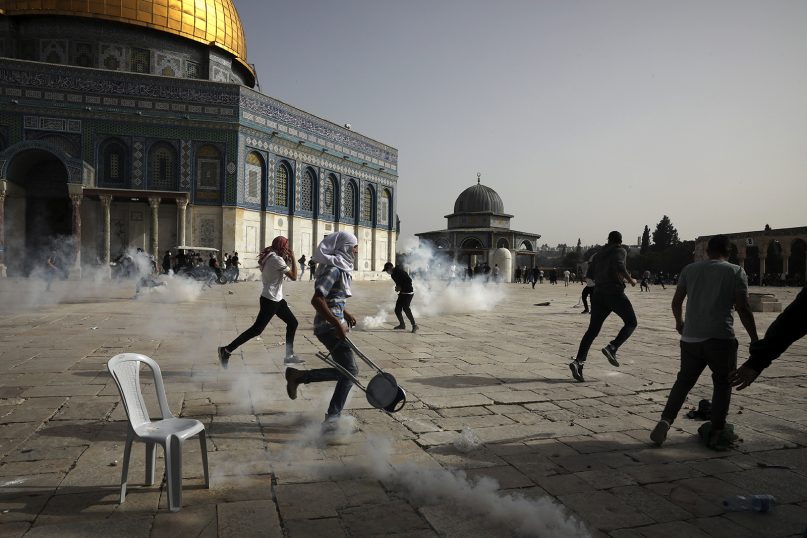(RNS) — Whenever there is trouble in Israel or the West Bank — as there is now in Israel’s recent attacks on Muslim worshippers at Al-Aqsa, the third-holiest mosque in Islam — politicians, pundits and international officials, in their routine way of attempting to lower tensions, call on the leaders on all sides to denounce violence.
But when it comes to Jerusalem, there are no leaders left on any side but the Israeli side.
Since the 1993 Oslo Accords, Israel has denied the Palestinian Liberation Organization, based in Ramallah, any engagement with the 350,000 Palestinians who live in East Jerusalem. Any discussion between the PLO leaders in Ramallah and their brothers and sisters in East Jerusalem has been systematically and often forcefully shut down by Israel.
Israel has been able to do this by insisting on full sovereignty over East Jerusalem in defiance of international law. No country in the world, including the U.S., which moved its embassy to West Jerusalem, has recognized Israel’s unilateral annexation of East Jerusalem.
As a result, when this year’s Muslim holy month of Ramadan coincided with various Israeli government-run events, the Israelis were unable to manage the conflicts that cropped up. When the daily call for prayer at the Al-Aqsa Mosque began at the same time that the Israeli army began a commemoration ceremony at the Western Wall, there was no civilized way to deal with the short interruption; the Israelis resorted instead to sabotaging the sound system of four minarets at the mosque.
Instead of allowing Muslims to congregate in the open space at the city’s Damascus Gate stairs to cool off in the evening after ending the day’s Ramadan fast, the Israelis banned Palestinians from the area. And when extremist Jewish groups held anti-Arab protests in which they repeatedly shouted “Death to Arabs,” the Israeli police protected the marchers rather than stop the incitement.
Israeli politicians prefer to shrink major problems into bite-size pieces. Each moment of friction is seen as a separate conflict to resolve apart from any other. But this week’s violence can’t be separated from longtime Israeli efforts at political disenfranchisement. The same 1945 emergency British law that has cut off Jerusalem’s Palestinians from Ramallah has been used to arrest senior Palestinian religious and political leaders and ban people for weeks and months from praying in their own mosque or from traveling abroad.
Palestinians in Jerusalem who are Israeli residents can travel freely, use their cars and enjoy benefits of the social welfare state. But they are missing an essential freedom that exists even in nearby Palestinian towns and cities: political rights. Palestinians are not allowed to create their own political parties or connect to the Palestinian parties of their choice. The Oslo Accords give a detailed description of the rights of Jerusalem residents in voting for the Palestinian Legislative Council, but in the upcoming election Palestinians in Jerusalem have been barred from using Israeli-run post offices to vote absentee.
The sharing of Jerusalem and its holy sites can and must be solved, not by oppressive laws and unbridled police action, but by allowing freedom of expression and assembly as well as allowing Palestinians the right to establish their own political structure and freely choose their leadership.
Such freedoms could prove helpful in times of tension, as we witnessed this week. But there are many in Israel who see Jerusalem in terms of a security issue. Instead of arresting political and religious leaders, a more logical step would be to talk to them. The sooner Israel does so, the better it will be for all concerned for peace and tranquility in the holy city.
(Daoud Kuttab is an award-winning Palestinian journalist from Jerusalem and a former Ferris Professor of Journalism at Princeton University. Follow him on Twitter @daoudkuttab.)





